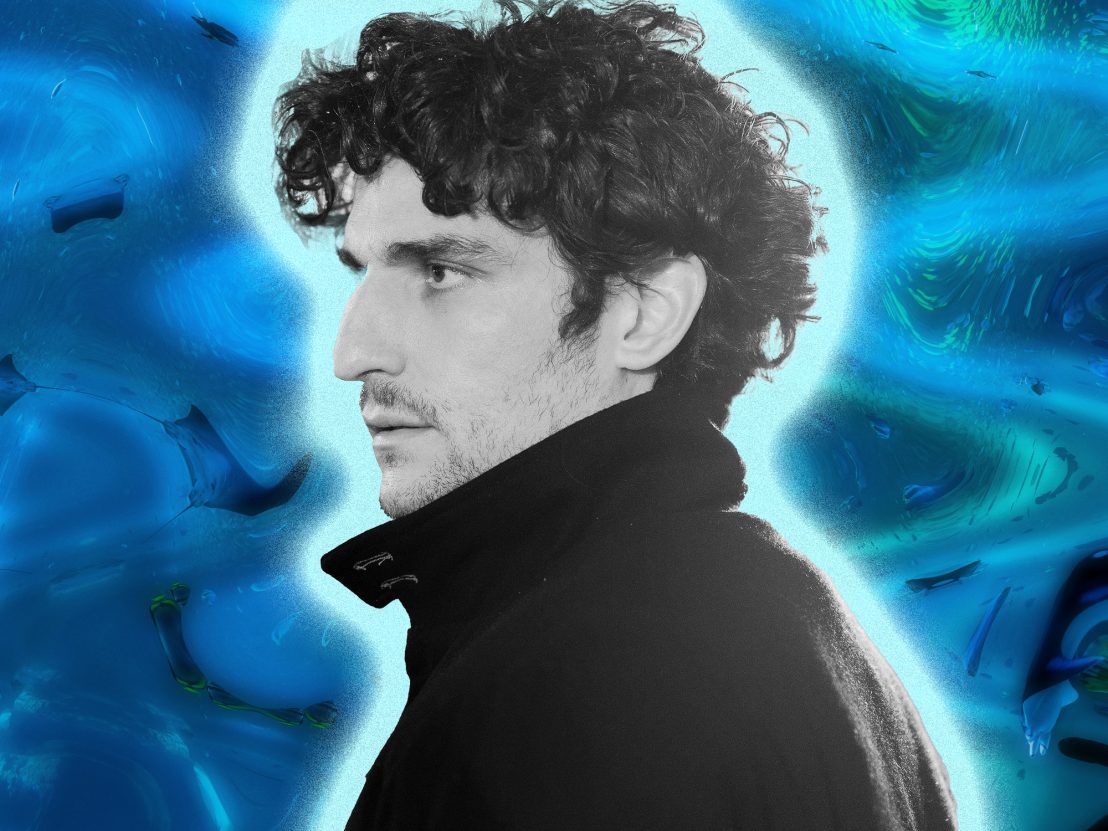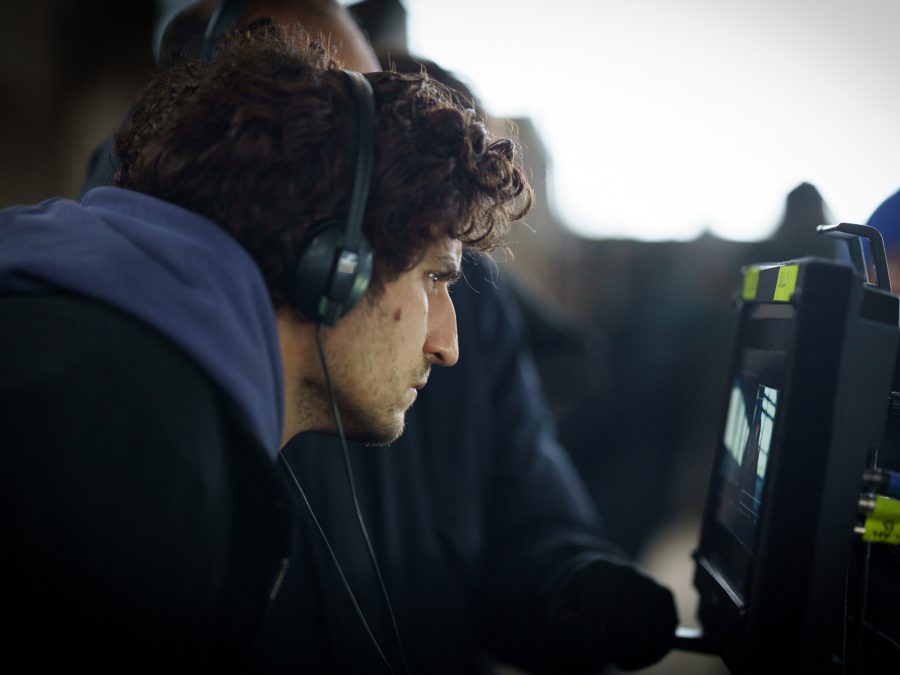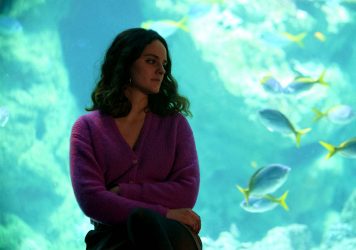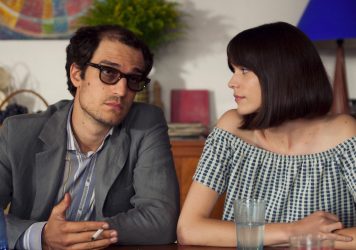
The French star discusses The Innocent, his fourth feature film as a director and a quintessentially French hybrid of romantic comedy and heist thriller.
Louis Garrel no longer needs an introduction. Son of celebrated arthouse director Philippe and an established actor in his own right, he has been a constant presence on French cinema screens since even before his breakout role in Bernardo Bertolucci’s The Dreamers 20 years ago. Fewer people may be aware of his career as a director, and his fourth feature film, The Innocent, might just be his best. We follow Louis’ alter ego Abel as he reckons with his mother’s new situation: an actress (Anouk Grinberb) teaching convicts in prison has fallen for and married Michel (the mesmerising Roschdy Zem), who is finishing a five-year sentence for robbery. When he gets out, the suspicious Abel joins forces with his best friend Clémence (Noémie Merlant) to tail his new stepfather.
The film is partly based on reality: your mother was hosting acting workshops in prison, and met and married someone there when you were younger. But the film goes in a direction that is more outlandish, fanciful, rocambolesque than reality.
Louis Garrel: At first, I just wanted to make a crime film — I like this kind of film, they’re fun and popular, and they get me out of chronique, meaning linear stories in a naturalist register, things that could happen in real life. Then, I thought I’d take this rather unusual autobiographical element about my mother. But afterwards, I was always worried about becoming trapped by my own subject. Films about someone’s relationship with their mother often end up being a bit visceral or falling into pathos, because the filmmaker wants to talk about the violence of the mother-son relationship. I therefore gave myself the ambition to never fall into pathos, to never be monotonous, and to make a film that was, as you said, as rocambolesque as possible. I had no desire to make a naturalistic film. I wanted, as much as possible, an adventure where the tone changes all the time — I like that a lot, it makes the audience lose their grip on the film. If the rom-com element is too strong, boom, we fall into the heist thriller, and if the heist film becomes too virile or there’s a risk of an excess of violence, which can be quite corny, hop, we get back into the romantic comedy. We could say the hormones were well balanced — there’d be a surge of one, then of the other…!
There was also the idea of making a film with strongly defined characters. I’d never done that before: constructing four characters who, by the end of the film, were changed or had solved one of their problems. The gamble was, there will be some rocambolesque situations, but because the viewers will be very attached to the actors and really love them, their personalities, and their characters, they will want to believe it.
I always find Roschdy Zem a highlight in any film he’s in, and to have a scene in which his incredible talent is actually pointed out within the film feels like a gift, to him and to the audience.
I liked that for two reasons. Having characters who aren’t actors but begin to act — not to use a big word like Brechtian, but it kind of is that — this distancing is very funny. Once again, the viewers aren’t fooled: they know that they’re watching actors, who pretend not to be actors, who then pretend to be actors. It’s like taking the viewers by the hand and telling them, you’re my accomplice on this.
It was also — not a reflection, I don’t like that word… An essay, or a theory, on emotions. This is something I’d realised while studying the technique of acting, which is something we don’t work on very much in France, I find. Beside his satire and critique of society, playwright Pierre de Marivaux also tells us about the birth of a feeling: that even by simulating a feeling, by pretending, a true feeling can be born. In his plays, we always have games between characters who pretend to love or no longer love one another, until suddenly, they feel something they didn’t expect. It’s a dangerous game, and I loved that idea.
It was also great for the element of romantic comedy: when you have that framework, the problem is how to surprise the viewers. I thought that a romantic comedy scene within an action scene would create a great distraction — you’re simultaneously worried about the heist going well, and the couple falling in love.

Were there some inspirations that helped you with this balance of tone?
I have a real passion for Italian cinema. There’s this thing in the work of Dino Rizzi and Mario Monicelli where the stakes for the characters can be tragic, but that doesn’t mean we’ll always maintain the same tone. All of a sudden, we can get a completely ridiculous or comical scene, and it won’t take away from the truth or emotion of the characters. Here, the stakes are a woman starting a new life and putting all her hopes in a new marriage — it’s tragic because if it doesn’t work out, that’s super sad. But within that, I can allow myself to have very lighthearted or even ridiculous scenes, because we’ll believe in this woman — at least, that was the challenge. The actors’ personalities also helped with that. Anouk [Grinberg] has the energy of someone in her twenties. She has no bitterness about life — that’s what’s beautiful about her. She still believes.
The heist film also feels like a quintessentially American type of movie. How did you deal with that?
When I was first writing the scene of the heist, there wasn’t the element of romance at all. At some point, a producer I knew told me, “Be careful, you’re not Michael Mann!” When you make an action scene, there’s this tendency to think, “let’s do it like Heat or Scarface” — but that’s not who we are. Jean Renoir once said in an interview, “talk about what you know,” and I’ve always remembered that. I thought, I’ll interrupt this surge of action, I won’t even try to do any stunts, and I’ll introduce an element that is very French — and that’s love! On set I always said, “We have to make Michael Mann in Poitou-Charentes,” which was a bit silly, but it meant not being pressured to make action scenes like those in big productions.
How did you communicate the tone of the film to your actors?
That’s one advantage when you act in your own film: I could establish the tone by acting myself. My character, who was the most austere, anxious, authoritative and annoying of all of them, was also a fixed element around which they could orient themselves.
I didn’t have to tell Roschdy much, he’s so great. I sometimes had to tell Anouk to hold back a little, but it worked so well between them — they were so beautiful together. It was a bigger deal for Noémie. She’d never done such a burlesque performance before. I told her to think of Jacqueline Maillan, a French boulevard actress who delivered very big, maximalist performances. I loved the character of Clémence so much, I could see so clearly her eccentricity, her madness, her courage — hiding a kind of wound, of course — and I told Noémie that she needed to get outside herself so that we could see Clémence. She trusted me, and it worked — it was amazing when she won the César, I was so happy.
I think it’s her best performance to date. It suits her so well.
It does. It’s funny, when she won another award in Cabourg, she actually said, “Louis allowed me to be, in a film, something that I already am in life.” It was really beautiful.
Published 25 Aug 2023

A sullen aquarium worker becomes suspicious of his mother's new husband in Louis Garrel's pleasingly offbeat familial drama.

A bold but ultimately disastrous biography of one of the leading lights of European cinematic invention.

By Elena Lazic
The co-stars of Céline Sciamma’s sumptuous period romance discuss the intimate – and political – nature of the film.